Zenobia Blu-ray Movie
HomeZenobia Blu-ray Movie 
ClassicFlix | 1939 | 73 min | Not rated | Nov 24, 2020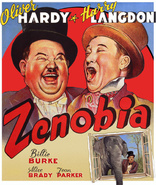
Movie rating
7 | / 10 |
Blu-ray rating
| Users | 0.0 | |
| Reviewer | 3.0 | |
| Overall | 3.0 |
Overview
Zenobia (1939)
A medicine-show mountebank's errant elephant complicates the engagement of a country doctor's daughter in the antebellum South.
Starring: Oliver Hardy, Harry Langdon, Billie Burke, Alice Brady, Jean Parker (I)Director: Gordon Douglas
| Period | Uncertain |
| Comedy | Uncertain |
| Romance | Uncertain |
Specifications
Video
Video codec: MPEG-4 AVC
Video resolution: 1080p
Aspect ratio: 1.38:1
Original aspect ratio: 1.37:1
Audio
English: DTS-HD Master Audio 2.0 Mono
Subtitles
English
Discs
Blu-ray Disc
Single disc (1 BD)
Playback
Region A (B, C untested)
Review
Rating summary
| Movie | 3.0 | |
| Video | 4.0 | |
| Audio | 3.5 | |
| Extras | 0.5 | |
| Overall | 3.0 |
Zenobia Blu-ray Movie Review
Reviewed by Jeffrey Kauffman November 26, 2020The annals of Hollywood Golden Era films featuring great comedy duos probably have two standout pairs that are remembered better than most: Abbott and Costello and Laurel and Hardy. But there might have been a third had Hal Roach's plan come to fruition to do an end run around a contract dispute with Stan Laurel by pairing his (supposedly erstwhile) partner Oliver Hardy with Harry Langdon, a once huge comedic star from the silent era who had never quite successfully matriculated to talkies. Laurel rather quickly "returned to the fold" (so to speak), making Roach's scheme ultimately moot, but there is this one fleeting example of what such a partnership might have offered to comedy fans. Unfortunately, it's not a great match, which is the total fault of neither Hardy nor Langdon, and instead rests with a peculiar plot involving a kind of lovelorn elephant (!) in a setting that almost seems to be Hal Roach riffing on the general ambience of Gone with the Wind. Hattie McDaniel (misbilled in both the opening and closing credits as McDaniels) is on hand, making this connection probably inevitable for modern day viewers, though Zenobia was released several months before the David O. Selznick classic.
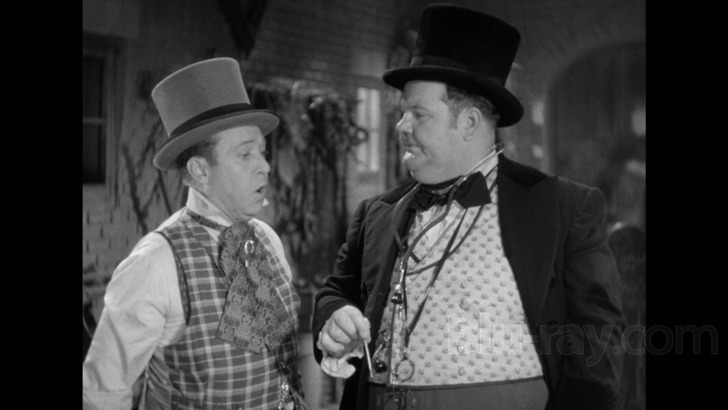
The film features an "1870" identifier in its opening moments, which makes the whole Antebellum aspect expected, even if the black actors in the film (Step'n Fetchit is also prominently featured) are for all intents and purposes still slaves, at least in how they're represented here. That may certainly chafe against modern sensibilities in much the same way the arguably slightly more overt presentations in Gone With the Wind have become over the years, but there's also no denying that both McDaniel and Fetchit manage to wrest some laughs from some potentially objectionable material (this is especially the case in terms of Fetchit's typical "brain dead" characterization).
What may ultimately deal this film a kind of death blow, however, at least for diehard Laurel and Hardy fans, is that Oliver Hardy is not the traditional overbearing blowhard he tends to be in the Laurel and Hardy films. Instead, he's a relatively kindly doctor named Tibbett who is seen offering his services free of charge on more than one occasion. Tibbett is married to a flibbertigibbet (Billie Burke) and is father to Mary (Jean Parker), who is seen in some of the film's opening scenes accepting the proposal of Jeff Carter (James Ellison). Carter's family is rather prominent (both his father and grandfather were governors), and Mary is worried that Jeff's mother (Alice Brady), a kind of hoity-toity type, won't like her family. That sets up a "culture clash" plot that might have played like the 19th century version of You Can't Take It with You, with star-crossed lovers trying to bring their comedically mismatched families together, but instead the film goes off on a completely peculiar tangent involving a traveling huckster named Professor McCrackle (Harry Langdon), whose pet elephant is ailing, which brings Dr. Tibbett into the fray.
Langdon has at least something approaching the "sad sack" quality that often informed Stan Laurel's performances, but there's simply not the same chemistry between him and Hardy, and it unfortunately means there's little of the comedic energy in this film that informs the best Laurel and Hardy outings, something that is perhaps exacerbated by the fact that the two comedians really don't even share all that many scenes together. There are laughs here (the interplay between Burke and Brady is quite enjoyable at times), but the film tries too hard to weave wildly disparate elements together, leaving verbal punchlines by the wayside to allow titular elephant Zenobia a chance to maraud through various structures, destroying them as she chases after her "true love", Dr. Tibbett. The fact that the elephant supposedly falls for the good doctor leads to a court case brought by McCrackle against Tibbett (at the behest of Jeff's mother, who wants to stop the marriage) for "alienation of affection", which is about as close as this film ever gets to smart comedy.
It's actually fun in a weird kind of way to see Hardy portraying a less fussy, relatively more stable, character, and Burke, while kind of intermittently annoying due to her flightly characterization, is often breezily humorous (she is often very busy in an "actorly" way in scenes where she's supposed to be in the background). If the romantic stars are a trifle of the bland side, there's typically enough chaos surrounding them to distract effectively, and the film features a relatively luxe production design for a Hal Roach film. There's some undeniable "irony by way of hindsight" in this film, given that the class differences between the Tibbetts and the Carters are supposedly front and center, while the treatment of the black characters in the film is barely even recognized, and when it is (as in a scene involving a little black boy learning the Declaration of Independence's claim that "all men are created equal"), it's presented in a resolutely unironic way.
Zenobia Blu-ray Movie, Video Quality 
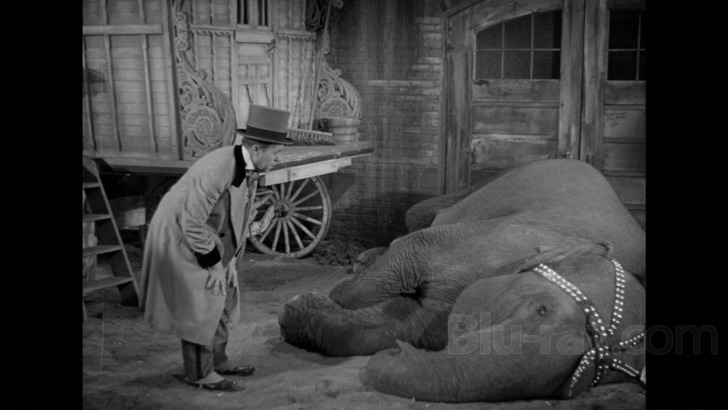
Zenobia is presented on Blu-ray courtesy of ClassicFlix with an AVC encoded 1080p transfer in 1.38:1. I've uploaded a screenshot in position 21 (after the screenshot of the disc main menu) which comes from the restoration demonstration (see the Special Features and Extras section, below) and gives at least a bit of information on the provenance of the element and restoration. It's clear that significant improvement has been made to the source, which in its unrestored version is kind of washed out and pretty recurrently speckled with all sorts of damage. The restoration features noticeably improved contrast for the most part (whites can still tend to bloom very slightly at times), and you really need to stay eagle eyed to spot any kinds of damage (note, for example, the hairline scratch running vertically down Hattie McDaniel in screenshot 10 to see how minimal it typically is). Grain looks natural throughout and I noticed no compression anomalies of any kind.
Zenobia Blu-ray Movie, Audio Quality 
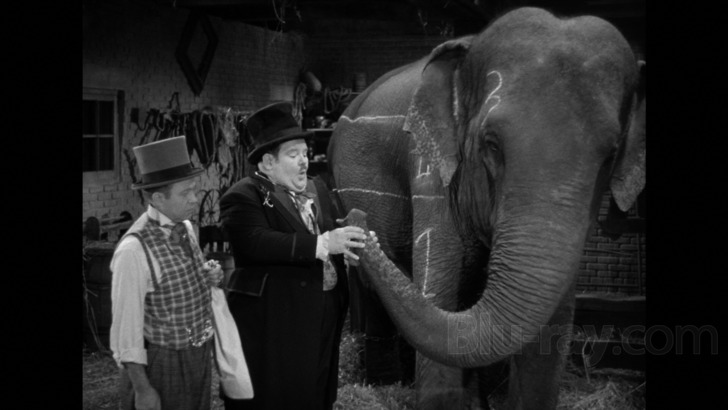
Zenobia's DTS-HD Master Audio 2.0 Mono track can't escape the era of its recording, but aside from an overall boxy sound, perhaps most noticeably in some of the music (including a song sung in the film), there's no real damage of any import. The film features occasional sound effects, like Zenobia spurting out the "elixir" that McCrackle tries to give her at one point, but this is a pretty talky enterprise, and the mono track suffices perfectly well. Optional English subtitles are available.
Zenobia Blu-ray Movie, Special Features and Extras 
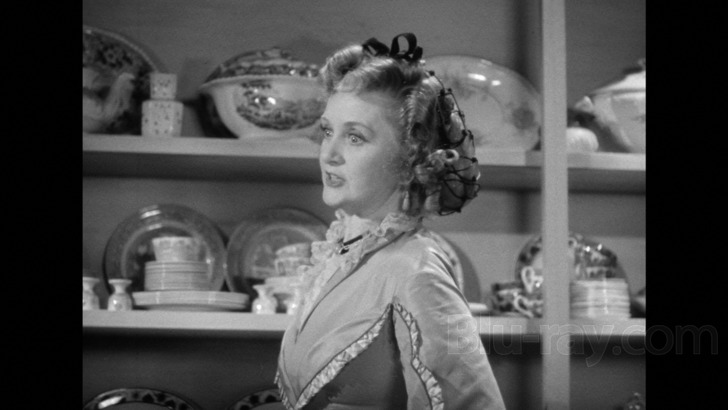
- Restoration Comparison (1080p; 5:15) features both side by side and before and after views of the restoration.
Zenobia Blu-ray Movie, Overall Score and Recommendation 
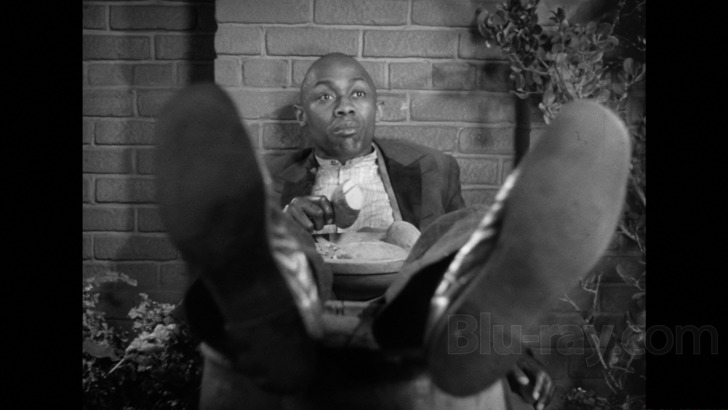
It's maybe a little unfair that Oliver Hardy was so famous for being "Oliver Hardy" that it can be downright disconcerting to see him in a different context. In that regard his quite commendable work in this film might strike some Laurel and Hardy fans as never quite working, I think at least in part because of preconceptions about how his characters "usually" behave. But there are some other issues here, including the very fact that the film features a romantically inclined elephant and a plot that doesn't allow the ostensibly focal comedians a chance to interact that much. The depictions of the black characters may well strike modern day eyes as intermittently objectionable as well. This is certainly a historical curio, though, with a certain weird charm at times, and ClassicFlix has provided a nice looking and sounding presentation, for those who are considering a purchase.
Similar titles
Similar titles you might also like

The Miracle of Morgan's Creek
1944

They Went That-A-Way & That-A-Way
Inside Out
1978

Running Wild
1927

The Good Fairy
1935

Moscow on the Hudson
Limited Edition to 3000
1984

You Can't Cheat an Honest Man
1939

The Old Fashioned Way
1934

School for Scoundrels
1960

Mr. Blandings Builds His Dream House
Warner Archive Collection
1948

It's a Gift
1934

A Night in Casablanca
1946

It's In the Bag
1945

Charlie Chan and the Curse of the Dragon Queen
1981

Way Out West
1937

It's the Old Army Game
1926

Mr. & Mrs. Smith
Warner Archive Collection
1941

The Talk of the Town 4K
1942

Soap: Complete Series - Seasons 1 - 4
1977-1980

Don't Tell Her It's Me
The Boyfriend School
1990

Sons of the Desert
1933